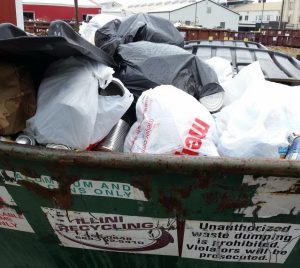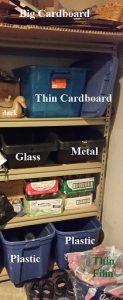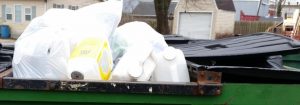I’ve been doing a lot of cleaning around the house lately, and I found my soap box! Wahoo! I’m going to clamber up on top of it today and talk about an item that is near and dear to my heart — recycling — or perhaps, more specifically, how NOT to recycle.
I live “in the country,” which means we don’t have curbside recycling. If we want to recycle, we have to put some significant effort into it. We installed a large shelving unit outside our mudroom door in the garage where we save up items to recycle for our periodic trips to Illini Recycling. Unfortunately, they no longer accept glass (and never accepted Styrofoam), so we have a few other places we have to take things. The transfer station on North Lincoln will take glass. Dart/Solo Cup will accept your clean Styrofoam to recycle (thanks guys!).
Nothing makes me crankier than going to Illini Recycling and seeing sloppy recycling practices which contaminate the entire collection bin (negating the efforts of many people who do a good job). For example, even though this is completely obvious to me (but apparently not to a large number of people going to Illini Recycling), a plastic garbage bag (or plastic shopping bag) isn’t actually paper, or aluminum, or cardboard — NOR IS IT PLASTIC, it is GARBAGE. If you want to get super technical, the plastic shopping bag (but not the plastic garbage bag) is called thin film plastic, and can be recycled at most grocery store entrances.

You could be forgiven if you couldn’t figure out that this photo (which I took this past week) is for the aluminum recycling bin. Yes, you can see 1 or 2 cans, but wow … look at ALL those plastic bags (and brown paper bags) — which, again, are not aluminum. I mean, come on people! My favorite this trip was the electric heater (with plastic casing) that was thrown in the plastic recycling bin. Really? Yes, it does have a bit of plastic on it, but I believe it also has a bunch of wiring and so forth, it’s not 100% plastic. Why, if one is going to all the effort to save recyclables and drive them to Illini Recycling, can’t they take that extra step to empty out the plastic bag into the collection bin so it doesn’t contaminate the rest of the items in the container??And, lest you think this doesn’t matter, it really does. The US exports about 1/3 of its recycling, and nearly 1/2 of it goes to China (scrap and waste represent the sixth-largest US export to China). For decades, China has sorted through these imports and used the recycled goods to drive its manufacturing boom. However, this past summer China declared that this “foreign waste” includes too many other non-recyclable materials that are “dirty,” even “hazardous.” Their complete ban on 24 types of recyclables took effect January 1st. Because metals are easiest to recycle, they are still welcome, but this ban will particularly impact plastics ― China is the dominant market for recycled plastic ― as well as paper and textiles.
China’s refusal to continue to buy our recycling (due to our sloppy recycling practices) puts our $5 billion recycling industry in jeopardy, driving down prices and causing some collection companies to take their recycling to the landfill. Adina Adler, a senior director with the Institute of Scrap Recycling Industries, says China’s new standards are nearly impossible to meet. For many materials collected by our recycling programs, sufficient markets and processing capability do not exist outside China.
 So, now that I’ve complained about plastic bags, and why it’s important to not use them, let me hold myself up as an example of how to recycle. I have plastic tote containers for thin cardboard (from small food boxes), plastic, thin-film plastic, glass, metal, paper (office paper and catalogs are sorted separately), and Styrofoam. I use smaller totes for heavier items and large totes for plastic. The top of the shelving unit holds the larger cardboard boxes, which I try to flatten before stacking, but always flatten before I load them into the car. All food containers are rinsed well or washed (this is important too — rotten food waste makes the process of sorting recycling dangerous and downright nasty, and is another reason our recycling is often considered waste). The totes are super easy to dump into the collection bins at Illini Recycling (no bags needed)! Here is a partial photo of our setup. The duck makes sure we do everything correctly.I hope that, first of all, you are recycling as much as you can. In addition to feeling good about helping out the planet, you’ll be amazed at how infrequently you need to take your trash container to the curb. We compost all our food waste, and recycle pretty much everything we can, so we only need to take out our (mostly empty) trash container maybe once a month. Once you’ve made the commitment to recycle, promise yourself you’ll make your effort count by doing it right.
So, now that I’ve complained about plastic bags, and why it’s important to not use them, let me hold myself up as an example of how to recycle. I have plastic tote containers for thin cardboard (from small food boxes), plastic, thin-film plastic, glass, metal, paper (office paper and catalogs are sorted separately), and Styrofoam. I use smaller totes for heavier items and large totes for plastic. The top of the shelving unit holds the larger cardboard boxes, which I try to flatten before stacking, but always flatten before I load them into the car. All food containers are rinsed well or washed (this is important too — rotten food waste makes the process of sorting recycling dangerous and downright nasty, and is another reason our recycling is often considered waste). The totes are super easy to dump into the collection bins at Illini Recycling (no bags needed)! Here is a partial photo of our setup. The duck makes sure we do everything correctly.I hope that, first of all, you are recycling as much as you can. In addition to feeling good about helping out the planet, you’ll be amazed at how infrequently you need to take your trash container to the curb. We compost all our food waste, and recycle pretty much everything we can, so we only need to take out our (mostly empty) trash container maybe once a month. Once you’ve made the commitment to recycle, promise yourself you’ll make your effort count by doing it right.
Thank you! I’ll hide the soap box now.



